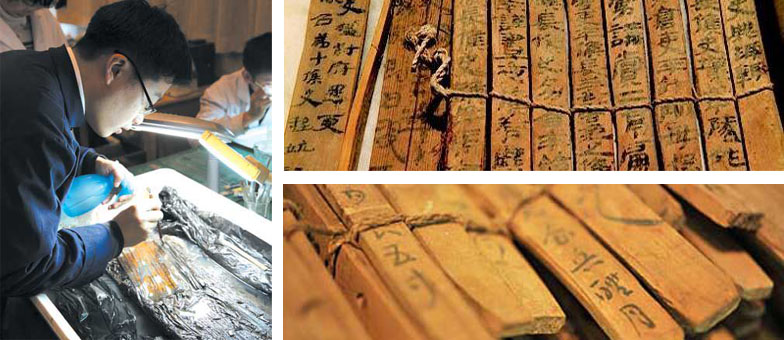Numbers key part of governance in ancient China

The bamboo slips in the Qin Dynasty stored by Peking University show many basic ideas on mathematics.
In the 1930s, Chinese scholars translated “shuxue” (literally meaning the study of numbers or counting) into “mathematics” in English, and then the term “shuxue” became a proper noun to describe the discipline of mathematics in Chinese.
But what terms were used earlier in history? From the Warring States period (475-221 BC) to the 400 years of the early Han Dynasty (206 BC-220), besides “shu” (number) and “jiushu” (nine categories of mathematics), what did ancient Chinese call the discipline of shuxue?
There was a term called “jishu” (counting), which appeared earlier than rod-arithmetic, arithmetic and arithmetic classics and also earlier than geometry, algebra, trigonometry and calculus. It was the first mathematical term for these ancient Chinese. “Jishu” is just a common name, but its meaning has endured great changes. Even today it is still a name for the sub-discipline of combinatorial mathematics.
The No. 2 issue of the 2015 Journal of Peking University indicated that a bamboo slip in the Qin Dynasty (221-206 BC) stored by Peking University described the meaning and value of counting, numbers and their applications in national administration. The bamboo slip has more than 800 Chinese characters, and represents the first long article in the history of Chinese mathematics.
Thus before The Nine Chapters on the Mathematical Art (the first detailed Chinese study of mathematics) gained currency, there was a notable period in which people utilized accurate counting to manage society. Although there were no works on mathematics handed down from pre-Qin times, it didn’t mean mathematics didn’t exist. Although there were no professional mathematicians, it didn’t mean no people were good at counting at that time. Besides the Mohist Canon which mentioned many mathematical basics, the ancient philosophers in pre-Qin times, especially Guan Zhong (c. 725-645 BC), Xun Kuang (313-238 BC) and Han Feizi (c. 280-233 BC) expressed their opinions on counting in their representative works.
Guan carried out reforms in the State of Qi, one of the Seven Powers in the Warring States period, and put an emphasis on the rule of law in governance. In his work Guanzi, he indicated that wise kings managing state affairs should depend on the rule of law instead of individuals’ intelligence, quantitative criteria instead of preaching, justice instead of seeking personal gains, and grasping the overall situation instead of niceties so that the state was effortlessly governed.
Moreover, Guan regarded measuring instruments and mathematical tools such as compasses, set squares, spirit levels and plumb lines as the kernel of the law, which became the highest rule of measuring right and wrong, the criterion of judging good and bad and the basis of conducting rewards and punishments. Guan defined hardness, weight, size, density, distance and quantity as objects that could be counted, in what was the first instance of an unambiguous definition of counting in the history of Chinese mathematics. It illustrated that Guan attached importance to the application of counting in strengthening governance and promoting prosperity.
In contrast to Guan, Xun pinpointed in Xunzi that a calculating king amassing wealth by heavy taxation would make a state perish. All kings, ministers and officials should use moral standards and laws to count the income and expenses of goods and wealth. Xun criticized kings and officials who regarded counting as a strict means of inspection and were only concerned with their personal gains and losses.
In Han Feizi, Han mentioned that the relationship between the monarch and his subjects was not as simple as a father-son relationship. Instead, it was a calculated relationship based on mutual gains and losses.
From the ancient philosophers’ perspective, counting not only refers to measurement, but also represents people’s strategic plans and measures. As a significant means of running a country, ancient philosophers thought highly of counting in governance.
Luo Jianjin is from the Institute for the History of Science and Technology at Inner Mongolia Normal University.
